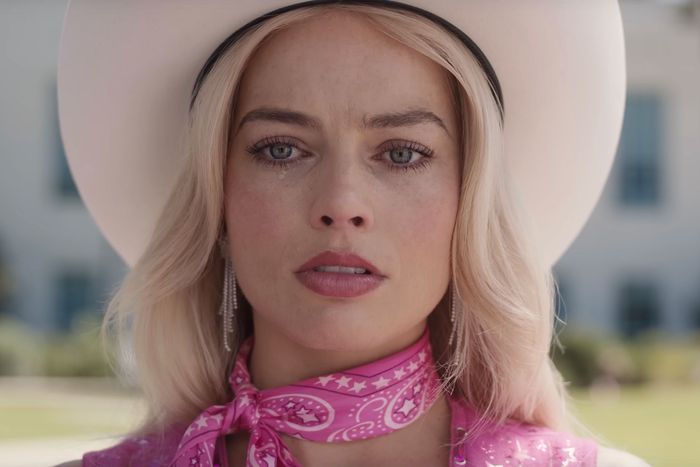
This article was originally published on July 28. We are recirculating it now timed to Barbie’s streaming debut on Max. Be sure to also read Alison Willmore’s review of the film, our profile of the woman who rescued it from development hell, and Jen Chaney’s salute to the film’s unsung hero.
After months of hot-pink hype, moviegoers flooded into Barbie expecting a dreamhouse fantasia of disco dancing, Ryan Gosling’s tanned abs, and existential Birkenstock jokes. But many of those moviegoers also looked deep into the Mattelian abyss and found themselves surprised to not just be laughing, but crying … a lot. In the days since the film was released, emotionally overwhelmed Barbies and Kens have been posting evidence of their teary journeys through Greta Gerwig’s masterwork. Turns out that going to see Barbie is kind of like being run over repeatedly by Barbie’s Dream Camper, but in a mostly good, cathartic way.
The exact scene that pushed you over the edge likely varies depending on your particular brand of emotional vulnerability. For the Middle-Age Barbies out there, it might have happened in the film’s third act, when Margot Robbie’s Barbie, frustrated by the way Ken (Ryan Gosling) has turned Barbie Land into a world ruled by male morons, reaches a breaking point. “I’m not good enough for anything,” she says through tears. Listening to this bright, gorgeous woman putting herself down prompts America Ferrera’s Gloria — a mother, a Mattel employee, and a woman stifled by the limitations of midlife — to launch into the film’s most memorable monologue. “I’m just so tired of watching myself and every single other woman tie herself into knots so that people will like us,” she says, with the urgency of a woman finally giving herself permission to uncork her frustrations. “And if all of that is also true for a doll just representing a woman, then, I don’t even know.”
Mom Barbies may have been moved when Rhea Perlman, the Artist Formerly Known as Carla Tortelli, who plays the ghost of Barbie doll inventor Ruth Handler speaks a line of dialogue designed to burst the tear-duct dams in the driest-eyed of humans: “We mothers stand still so our daughters can look back and see how far they’ve come.” And Daughter Barbies could lose it when, as Barbie mulls her decision to leave Barbieland, she sees flashes of other girls and women experiencing the joy and surprise of being alive. This montage is sweet and touching without music, but because it is set to Billie Eilish’s “What Was I Made For?” it will make you sob until the spirit leaves your body and floats into an adjacent auditorium to watch Oppenheimer so it can encounter a slightly less wrenching cinematic experience. Seriously, “What Was I Made For?” is actively murdering people. It has almost killed me three times today alone.
Kens might have shed a self-aware tear in the face of Ryan Gosling’s portrayal of Barbie’s primary almost-boyfriend. He has so much range, it’s like he’s tackling multiple movie genres at once. He’s simultaneously in a comedy, a western, a musical, an action movie, an old Annette Funicello/Frankie Avalon flick, an extremely upsetting remake of Point Break, and a rom-com. He’s also, at times, in a drama, having a flipped version of the existential crisis Barbie experiences. It’s a testament to how good Gosling is that when Ken has a complete meltdown over the prospect of no longer being Barbie’s official lesser half, you actually feel a bit bad for the guy. Normally I’d enact violence on someone singing Matchbox Twenty with that much conviction. But not when he’s Just Ken, by Way of Baby Goose.
But every Barbie and Ken — hell, even Allan — probably got verklempt during the most beautiful moment in Barbie. It takes place when Robbie’s blonde bombshell finds herself sitting on a bench in Los Angeles next to an older woman played by 91-year-old Academy Award–winning costume designer Ann Roth. Barbie looks, awestruck, into this woman’s face with all of its wrinkles and absorbed wisdom. Having only ever resided in the toy-populated Barbie Land, Barbie has never seen a creature like this before: a lady who has actually aged. “You’re so beautiful,” Barbie says, as if she’s just seen Jesus. Roth smiles back at the flawless Barbie with warmth and confidence. “I know it,” she responds. Greta Gerwig said in an interview with Rolling Stone that she was almost persuaded to drop the scene from the film. She didn’t because, in her words, “If I cut the scene, I don’t know what this movie is about.”
Indeed, what’s so special about this sequence is how seemingly minor yet groundbreaking it is. When was the last time you went to a movie — let alone a massive, mainstream movie — and saw a woman in her ’90s described as beautiful? Robbie’s admiration and Roth’s assurance make it feel as though a new cinematic language for Hollywood female characters is being invented right in front of us. Although really, what Barbie and her new friend are saying isn’t, “You’re beautiful,” or, “I know it.” They’re saying, “Hi, Barbie,” one phenomenal woman to another. [Cue a tiny, plastic hand raising a tiny tissue to your eye.]
More on Barbenheimer
- Ryan Gosling and Emily Blunt Break Up with Barbenheimer on SNL
- Fallout Is Barbenheimer: The TV Show
- How Christopher Nolan Crafted the World of Oppenheimer


